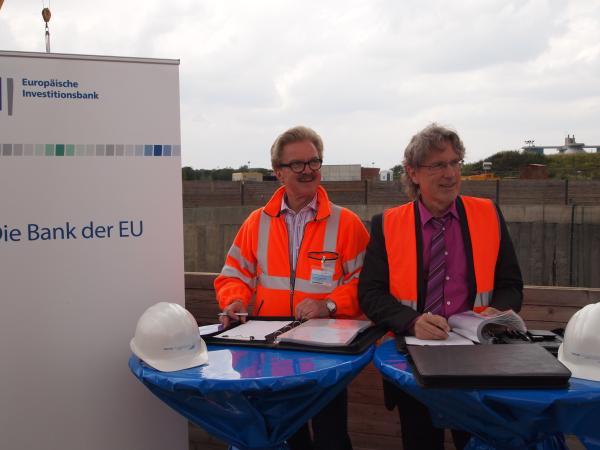
A centre of Germany’s heavy industry will be restored to its natural state thanks to a EUR 450 million loan from the European Investment Bank (EIB) for the project to rehabilitate the Emscher river. The EIB and the project promoter, Emschergenossenschaft, signed the finance contract in Essen today.
With a fixed interest rate and a maturity of up to 45 years, this loan from the EU’s bank is helping to finance one of Germany’s most costly urban and regional development projects. In the last century, heavy industry and a dense population left its mark on this central part of the Ruhr area. For decades, the Emscher river and its tributaries were used as an open sewerage system. In future, wastewater will be channelled through closed underground canals so that the river and its tributaries can be restored to their natural state and new recreation areas can be created for the approximately two million inhabitants of the Emscher’s catchment area. At the same time, the reclaimed areas will offer growth opportunities for the region’s economy.
The loan contract signed by Emschergenossenschaft and the EIB today concerns the centrepiece of a comprehensive infrastructure project: a 51 kilometre-long, 40 metre-deep, state-of-the-art wastewater canal from Dortmund-Deusen to Dinslaken where the Emscher joins the Rhine. For Emschergenossenschaft, this EIB loan is the second pillar of the financing of the Emscher rehabilitation project alongside the support from the North Rhine Westphalia region.
In the words of EIB Vice-President Matthias Kollatz-Ahnen: “The river Emscher has long been central to a region characterised by industry and mining. When industrial and social structures change, people’s expectations of cities and their surroundings also change. The goal of the Emscher rehabilitation project is to restore the river to its natural state and enable the creation of leisure parks and new areas for economic growth on its banks. I am delighted that the European Investment Bank is helping to finance such an important undertaking.”
Emschergenossenschaft’s CEO Jochen Stemplewski added: “With a total cost of EUR 4.5 billion and 350 kilometres of water courses, the Emscher rehabilitation project represents Europe’s biggest attempt to restore an entire river and its surroundings and is a driver of structural change. We are giving the people of the region their river back and improving their quality of life. The finance contract with the EIB is supporting this important project.”
Background information:
The EIB is the European Union’s bank. Its purpose is to promote the EU’s objectives by providing long-term loans for viable projects.
Emschergenossenschaft was founded in 1899 as Germany’s first water supply and distribution association. Its tasks since then include maintenance of the river Emscher, wastewater collection and treatment and flood protection. It has been planning and implementing the Emscher rehabilitation project since 1992.
Emschergenossenschaft: www.emschergenossenschaft.de, www.abwasserkanal-emscher.de
Photographer: Photos Eva Henkel ©EIB
Download original